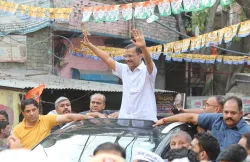Delhi liquor scam case: Will soon file prosecution complaint against Kejriwal and AAP, ED tells SC
Delhi Chief Minister Arvind Kejriwal was arrested on March 21 in the money laundering case in which the apex court granted him interim bail from May 10 to June 1. It ordered him to surrender on June 2.

The Enforcement Directorate (Ed) on Thursday told the Supreme Court it will soon file a prosecution complaint against Delhi Chief Minister Arvind Kejriwal and the Aam Aadmi Party (AAP) in a money laundering case linked to the alleged excise policy scam.
Additional Solicitor General SV Raju, appearing for the ED, told a bench of Justices Sanjiv Khanna and Dipankar Datta that the agency proposed to file a prosecution complaint (charge sheet) against Kejriwal and the AAP.
"We will do it shortly. It is in the pipeline," he told the court.
The ED made the statement when the court was hearing Kejriwal’s challenge to his arrest in the money laundering case arising from the alleged Delhi excise scam.
Raju claimed the probe agency has enough evidence to show that Kejriwal demanded Rs 100 crore bribe which was used by AAP in the Goa assembly poll campaign.
"We have direct evidence that Kejriwal stayed in a seven-star hotel, whose bills were partly paid by an accused in the case," Raju submitted, adding Kejriwal played a key role in the formulation of the now scrapped Delhi excise policy.
He alleged that Kejriwal, as the national convenor of the AAP, was vicariously responsible for the alleged scam. Kejriwal, despite being the chief minister, does not hold any departmental portfolio.
Solicitor General Tushar Mehta, who also appeared for the ED, questioned the maintainability of the petition, saying that barring the first two occasions when Kejriwal opposed the remand orders, he virtually "consented" to judicial custody.
He submitted the court cannot hold a mini-trial at the remand stage and examine material and other evidence available with the investigating officer.
"The court can only see whether there is any material for arrest and not what material is there. In this case, the materials were seen by the trial court and the high court. The high court had summoned the case files and perused the material. Mini-trial, which this court is called upon to do, is what we are opposing," he submitted.
Mehta said that if this court starts interfering at the remand stage, it will open the doors for powerful people to approach the apex court directly, without following the procedure prescribed under the Code of Criminal Procedure (CrPC).
"There are certain in-built safeguards provided under section 19 of PMLA, which deals with powers of arrest of ED officer. More rigorous the provision of arrest, the less scrutiny by courts," he said.
The bench, however, did not agree with the submission of Mehta and said that if there is a violation of section 19 conditions, the courts can interfere.
"There are several petitions filed directly in the Supreme Court under Article 32 and this court has nullified arrests or granted bail. Yes, the remedy cannot be excluded and remand court or the high court usually look into these aspects. It is not that we don't have jurisdiction but normally we observe judicial restraint, because there are alternate remedies available. However, we cannot overlook when there is a grave case," the bench told Mehta.
During the nearly day-long hearing, the bench quizzed the Enforcement Directorate on the procedure adopted to arrest Kejriwal and wondered how can investigating officers ignore exculpatory materials favouring him while exercising the power to arrest.
"Assuming that the Investigating Officer (IO) has material in possession. On one hand incriminating, on the other exculpatory. There can't be a dispute that IO has to be fair. If he ignores the latter absolutely and says I have reasons, would it not be a ground for bail?" Justice Datta questioned Raju.
"You can't say only one side has to be seen by IO," Justice Datta said, adding there has to be proper application of mind and the IO has to balance his finding with inculpatory and exculpatory material.
Raju contended that the satisfaction of the IO under Section 19 is "purely subjective" and it does not require that all material have to be reflected in the reasons to arrest.
Underscoring the importance of exculpatory material, the bench said if this is held from an accused, how will he argue for bail.
The bench also said ED cannot rely on post-arrest material to defend an arrest.
"We have to put the curtain down at the date of arrest. Material should be sufficient prior to arrest and you can't rely on post-arrest material."
It also dealt with Raju's submission that the AAP being a political party, is an association of individuals and the anti-money laundering law can be invoked against it under section 70.
The hearing remained inconclusive and would continue on Friday.
The court, however, barred him from visiting his office or the Delhi secretariat, and signing official files unless absolutely necessary for obtaining the lieutenant governor's approval.
The matter relates to alleged corruption and money laundering in the formulation and execution of the Delhi government's excise policy for 2021-22, which has now been scrapped.
(With PTI inputs)
Also read: Swati Maliwal wants Delhi Police should take action in assault case, say sources